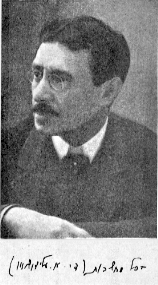Israel Isidor Eljaschoff
Israel Isidor Eljaschoff (also in other transliterations; author name Baal Makhshoves ; born September 13, 1873 in Kaunas , Russian Empire ; † January 13, 1924 in Kaunas, Lithuania ) was a doctor, author and literary critic in the Yiddish language.
Life
Eljaschoff's parents were wealthy Jews in Kaunas. At the age of ten he attended the yeshiva in Grobiņa , Latvia, and from twelve he attended a grammar school in Switzerland . Eljaschoff studied biology and medicine in Berlin and Heidelberg . He practiced as a doctor in Kaunas, Vilnius, Warsaw and St. Petersburg. He began his first literary attempts in Berlin. He came into the circle of Theodor Herzl and took part in August 1897 as a delegate from Germany at the first Zionist congress in Basel . From 1899 he wrote at the request of the Warsaw publicist Joseph Lurie (1871-1937), editor of the Warsaw weekly newspaperThe yud , also in Yiddish. Theodor Herzl asked him to translate the novel Altneuland (1902) from German into Yiddish and Eljaschoff became one of the most widely read Yiddish translators, he also translated Lev Tolstoy and Ivan Turgenev .
After fifteen years in the West, he went to Warsaw in 1901, where he only worked cursory as a doctor, mainly devoting himself to literature. His regular literary reviews in Der yud made him the leading literary critic and literary theorist of Yiddish literature and ensured the further dissemination of the classic Yiddish authors Sholem Aleichem , Mendele Mocher Sefarim , Jizchok Leib Perez and Nachum Sokolow as well as modern Hebrew authors such as Chaim Nachman Bialik and Sholem Asch . In view of the linguistic duality , Eliashoff emphasized the unity of Jewish literature: "Tsvey Shprakhn - Eyneyntsike literature". In 1910 he became editor of the daily newspaper Die Jewishische Demokratie in Riga and in 1912 columnist in the newspaper Freind in Warsaw. Between 1910 and 1915 Eljaschoff had his collected writings appear in Vilnius.
In World War I his publication activity was interrupted, since not only the Yiddish press was censored tightened and then set, but he himself also as a medical officer in the Imperial Russian Army was drafted. At the armistice in 1918 he went to Kiev .
In September 1921 he took part in the 12th Zionist Congress in Karlsbad . After his plans to work in the now Lithuanian Kaunas as part of an autonomous Jewish cultural work, he took over the management of the Yiddish department at Klal-Verlag in Berlin in 1921 . His literary work only flourished for a short time, because he fell ill and returned to the house where he was born in Kaunas in 1923.
His younger sister Esther Eljaschoff (1878–1941) was a university lecturer in philosophy in St. Petersburg and in 1921 founded the Jewish university courses in Kaunas.
Fonts (selection)
- Isidor Eljaschoff: Ch. D. Nomberg , in: Ost und West , 11, 1903, pp. 763–768
- Dr. J. Eljaschoff, On jargon ("Jüdisch") and jargon literature , in: Berthold Feiwel & Ephraim Moses Lilien (eds.), Jüdischer Almanach 5663, Berlin: Jüdischer Verlag, 1902, p. 58
literature
- Baal Makhshoves . In: Encyclopaedia Judaica , Volume 2, Jerusalem 1973, pp. 4-4 (en). jewishvirtuallibrary
- Eljaschoff, Isidor , in: Jüdisches Lexikon , Volume 2, 1927, p. 368f
- Maria Kühn-Ludewig: Yiddish books from Berlin (1918-1936): title, people, publishers , Kirsch, Nümbrecht, 2008 ISBN 978-3-933586-56-8 , pp. 128f
- Salomon Wininger : Great Jewish National Biography . Kraus Reprint, Nendeln 1979, ISBN 3-262-01204-1 (reprint of the Czernowitz edition 1925). Volume 2, p. 150. There the German translation of the song of a traveling companion is printed .
- Angelika Glau: Changing Jewish Self-Image: Yiddish Literature at the Beginning of the Twentieth Century . Wiesbaden: Harrassowitz, 1999 ISBN 3-447-04183-8 Zugl .: Potsdam, Univ., Diss., 1998
Web links
- Literature by and about Bal-Machšoves in the catalog of the German National Library
- Literature by and about Israel Isidor Eljaschoff in the bibliographic database WorldCat
- Marcus Moseley: Bal-Makhshoves at YIVO
Individual evidence
- ↑ Joseph Lurie . In: Encyclopaedia Judaica, Volume 11, pp. 582-583 (en).
- ^ Eljaschoff, Esther , in: Jüdisches Lexikon, Volume 2, 1927, p. 368; and Eliashev, Ester at YIVO
| personal data | |
|---|---|
| SURNAME | Eljaschoff, Israel Isidore |
| ALTERNATIVE NAMES | Baal Makhshoves (author name) |
| BRIEF DESCRIPTION | Yiddish Lithuanian writer and journalist |
| DATE OF BIRTH | September 13, 1873 |
| PLACE OF BIRTH | Kaunas |
| DATE OF DEATH | January 13, 1924 |
| Place of death | Kaunas |
